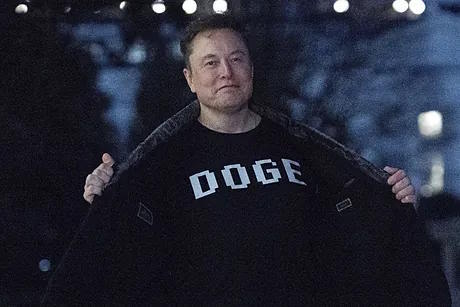The most powerful man in the world managed, with all kinds of pressures, threats, and favors, to get Congress to give the green light last week to what he dubbed as a "big, beautiful bill", a budget adjustment project that extends the tax cuts his government approved in 2017 (which were expiring soon) in exchange for reductions in government spending on social programs. The White House has celebrated the news, ensuring that it will create jobs and bring wealth, despite almost unanimous consensus that it will skyrocket the public deficit by several trillion dollars and increase the level of debt. Its entire media apparatus has been focused for days on a communication campaign to highlight the alleged benefits. But they have not gained the support of the world's richest man and the former head of DOGE, the Department of Government Efficiency that has been responsible since February for cutting programs, laying off tens of thousands of employees, or closing federal agencies.
In a television interview, which will be broadcast in its entirety over the weekend, Elon Musk, now detached from the administration and theoretically focused on his businesses, criticizes Trump's "beautiful law," stating that it will not only worsen the situation of public accounts but also undermine the efforts and legacy of the department he created and filled with workers from his companies, many of them inexperienced twenty-somethings in public management.
"I have been disappointed to see the huge spending bill, frankly, that increases the budget deficit, not only reduces it, and undermines the work being done by the DOGE team," Musk said clearly in a segment previewed this Tuesday night, Washington time, almost at the same time as one of his rockets, in Starship by Space X, disintegrated during a test flight, the third major setback in a row for the company.
Musk dares to say what all specialists warn, starting with the Congressional Budget Office, which estimates that the deficit will soar to 3.8 trillion dollars by 2034. There is little doubt about this, even among Republicans. Very few openly opposed it, and even those who yielded, due to pressures and calls from Trump and threats from the MAGA movement, admit that it will undoubtedly add to the deficit. Musk, furthermore, drives the point home by stating that he believes "a law can be great or it can be beautiful," he told CBS News, "but I don't know if it can be both. That's my personal opinion." A blow to one of the pillars of the president's economic program.
At the end of April, Musk informed Tesla investors that he would refocus on his businesses, after three months almost entirely devoted to being with Trump and directing the takeover of power in almost all branches of the administration, even those he should not have access to. "Probably starting next month, in May, my time dedicated to DOGE will decrease significantly," Musk said in a conference call about Tesla's (poor) results.
DOGE was conceived, in theory, to cut tens of thousands of federal jobs under the pretext of reducing fraud, waste, and abuse, accessing taxpayers' private data in the process and cutting vital programs for many Americans.
The Big and Beautiful Law passed the House of Representatives with 215 votes in favor and 214 against, but it must overcome Senate doubts. All Democrats and two Republicans, Representatives Thomas Massie (Kentucky) and Warren Davidson (Ohio), voted against it. Even the chairman of the House Freedom Caucus, Andy Harris (Republican from Maryland), voted "present," staying neutral. Its goal is to cut approximately 1.5 trillion dollars in public spending. However, the U.S. government has a debt of over 36 trillion dollars and spent 1.05 trillion dollars more than it collected in fiscal year 2025, according to the Treasury Department. Despite numerous announcements from DOGE, boasting that it would save taxpayers trillions of euros.
